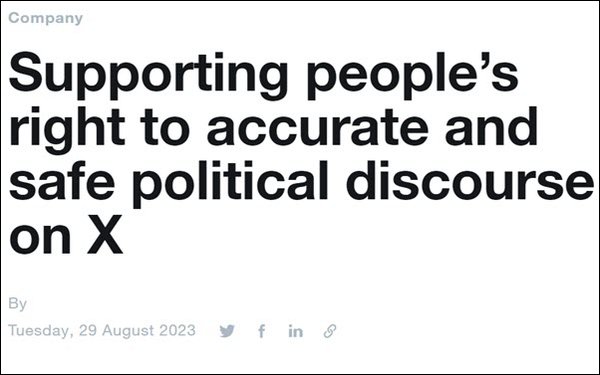X To Allow Ads From Political Candidates, Parties
- by Karlene Lukovitz @KLmarketdaily, August 30, 2023

X, formerly Twitter, announced on Tuesday that it will resume taking ads from political candidates and parties for the first time since 2019.
In January, the social platform began taking “cause-based” ads — ads that address political issues like voter registration — in the U.S., and indicated its intention to at some point expand the types of political ads allowed.
The platform — which lost about half of its advertising revenue to big-brand defections after Elon Musk acquired it in October 2022 and decimated content moderation and election policies staff as part of mass layoffs — dropped the big news six paragraphs down in a corporate blog headlined “Supporting People’s Right to Accurate and Safe Political Discourse on X" (above).
advertisement
advertisement
The blog first touts the platform’s role in public discourse (“More than half a billion people from around the world gather on X to talk about their interests in real time, and that includes elections”) and states that it is expanding its safety and elections teams and “updating” its Civic Integrity Policy in preparation for elections (2024’s U.S. presidential race is not specifically mentioned).
“Building on our commitment to free expression, we are also going to allow political advertising,” it continues. “Starting in the U.S., we’ll continue to apply specific policies to paid-for promoted political posts. This will include prohibiting the promotion of false or misleading content, including false or misleading information intended to undermine public confidence in an election, while seeking to preserve free and open political discourse.”
X also said it will establish a “global advertising transparency center” to allow users to review political posts being promoted on the platform — a capability required under the European Union’s new Digital Services Act — and use “robust screening processes to ensure only eligible groups and campaigns are able to advertise.”
Regarding the content of non-paid posts, X promises that its expanded team will “focus on combating manipulation, surfacing inauthentic accounts and closely monitoring the platform for emerging threats.”
The blog points readers to its existing conversations rules, noting that the Civic Integrity Policy provides “an extra layer of protection that is applied for a limited period of time before and during an election.”
It also says that X is updating that policy in an effort to “strike the right balance between tackling the most harmful types of content — those that could intimidate or deceive people into surrendering their right to participate in a civic process — and not censoring political debate.”
Specifics on that policy's updates are not spelled out, but the blog does state that the policy will be “aligned with our updated enforcement policy, Freedom of Speech, Not Reach,” and that X will add publicly visible labels to posts identified as potentially violating the policy, “letting people know when their reach has been restricted.”
The promised practices and policies regarding non-paid posts of a political nature appear, on first reading, to be quite similar to those laid out by pre-Musk Twitter.
However, critics will be closely watching the implementation of the ad and posts policies, given their potential for major impacts on the democratic process.
Former President Trump’s heavy use of Twitter before and after the 2020 election has been blamed for helping to radicalize his followers, leading up to the Jan. 6 attack on the U.S. Capitol. Trump was subsequently banned from the platform, but Musk reinstated his account, along with others that had been banned for promoting misinformation, violence or otherwise breaking Twitter’s rules.
X has been pushing hard to win back advertisers fearful of the platform’s potential effects on brand safety, most notably by hiring former NBCUniversal advertising chief Linda Yaccarino as its CEO.
But in recent days alone, X has called its “free speech” stance into question, and been widely criticized, for actions including removing news headlines, throttling traffic to the sites of some rivals and media, and blocking links to a political organizational platform used by the Democratic party.
In addition, on Aug. 1, X sued the nonprofit research organization Center for Countering Digital Hate, accusing the group of scraping data to portray a false image of X as being filled with hate speech. That group and others, including the Anti-Defamation League, had previously documented a rise in hate speech on the platform after Musk's acquisition.
Two weeks after Musk's suit against CCDH was filed, Media Matters for America released a new analysis that led to more advertiser defections by pointing out that X had been placing ads for blue-chip brands on a pro-fascist, pro-Hitler account (the account was subsequently suspended).


